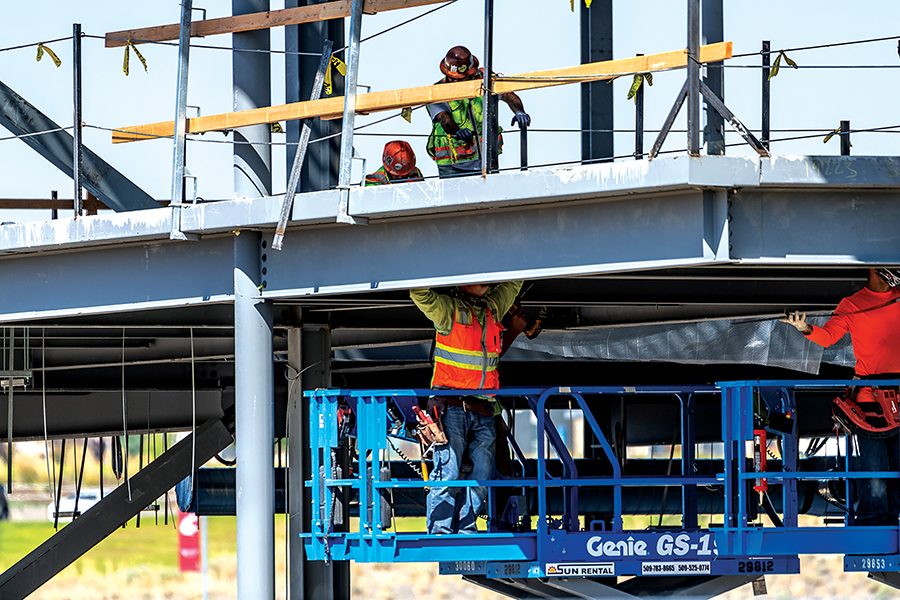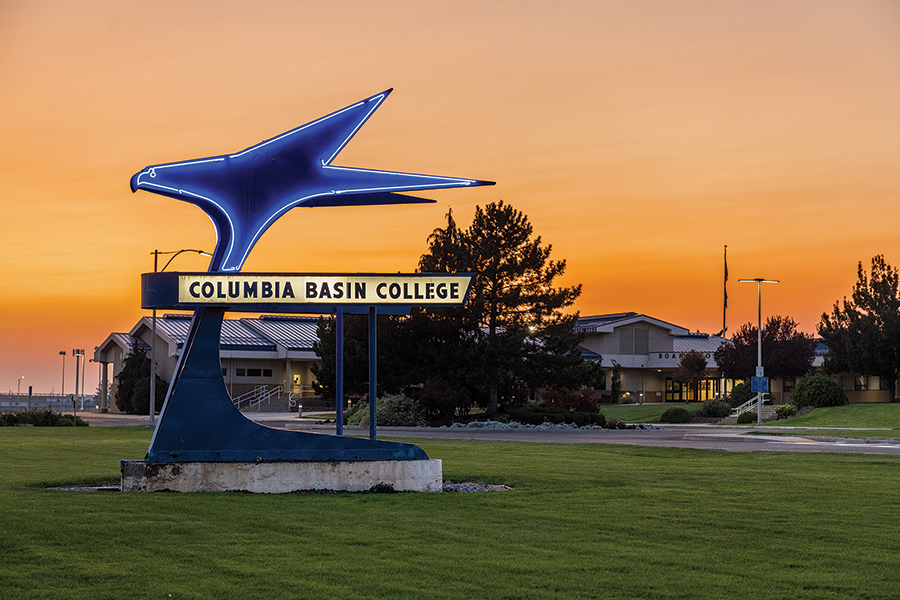
Home » Higher Education: CBC, WSU-Tri-Cities building for a future when students return to campus
Higher Education: CBC, WSU-Tri-Cities building for a future when students return to campus

October 15, 2020
The Tri-Cities’ higher education campuses don’t have many students on campus this fall.
The coronavirus pandemic sent the majority to remote learning platforms at Washington State University Tri-Cities and Columbia Basin College for the fall.
But that doesn’t mean they aren’t planning for their students’ eventual return to campus.
Both institutions are moving ahead with building projects on their main campuses.
WSU Tri-Cities is anticipating a spring 2021 opening of a
$30 million academic building. CBC begins work on a $30 million student recreation center in 2021.
There are other smaller capital projects going on and plenty of effort assisting students affected by coronavirus.
WSU Tri-Cities
WSU Tri-Cities has yet to get a firm number of students attending classes this fall semester — the majority are taking virtual classes.
Chancellor Sandra Haynes estimated the number to be about 1,800. Fall enrollment totaled 1,813 in 2019 and 1,841 in 2018.
WSU Tri-Cities employs 77 certified staff.
That does not count adjunct faculty, plus another 148 staff members.
The Richland campus has an overall budget of $25 million but the operational budget is more like $22 million due to pending cuts prompted by the pandemic, Haynes said.
“(WSU President) Kirk Schulz has asked each department for a 10% decrease in our budgets,” she said. “We’ll do that by not hiring people for vacant positions, and we can make cuts in noninstructional services. So freezing of hiring and noninstructional cuts is how we’ll make those cuts.”
Meanwhile, construction of a $30.4 million academic building, funded by the state Legislature is underway.
The building will house 12 laboratories for physics, biology, chemistry and anatomy/physiology, as well as two 96-seat classrooms, and a central gathering area with stadium seating for large groups, presentations and community events.
Haynes said the school is on the same timeline, with completion in 2021.
“We had actually done a lot of the groundwork last fall (of 2019) so we’ve always been on schedule with this project,” Haynes said.
Though the pandemic did not affect the construction schedule, officials have added new features.
“We had planned for this building before Covid with state-of-the-art technology,” Haynes said.
“We’ve built in Zoom capability in all of our classrooms. If a student can’t make it to class for some reason, they can join by Zoom, or see the recorded class session on Zoom.”
Haynes said that Covid has made WSU officials look further down the road at what future buildings could look like.
“Last spring we did some scenario planning,” she said. “What if we have to stay virtual? What if we have face-to-face learning? What changes will be made if we have a hybrid model? We’ve planned for all of those scenarios, so we’re ready for just about anything. But when we make plans, we’re first concerned about student and faculty safety. How do we deliver that?”
Haynes added that one thing school officials now know is that technology has enabled different types of learning experiences.
“No longer does everybody have to be in the classroom,” she said. “But one thing, too, is not everything can be done with technology. You can’t put an IV in someone while online. More and more, the newer buildings will be using newer technology.”
In August 2020, the school received a $100,000 donation to the WSU Wine Science Center from the Paul Lauzier Charitable Foundation.
“This gift and matching funds will allow us to complete a laboratory and equip it,” Haynes said.
“The Wine Science Center will be complete. It’s a teaching laboratory, not research, so there will be classes in chemistry, biochemistry and microbiology.”
The branch campus also is looking at ways to work with the local agriculture industry.
“We want to do right by students who work in the ag industry. We’re looking for a partnership,” Haynes said.
She also underscored the importance of capitalizing on the campus’ locations at the Tri-Cities Research District to bolster its science, technology, engineering and math programs with the STEM community.
Haynes said WSU Tri-Cities officials are well aware of student hardships in the wake of the pandemic.
STCU and Battelle donated $60,000 in 2020 to help students.
“For things like if a student’s car breaks down, or a gap to fill a paycheck, or if someone gets sick and needs support,” Haynes said.
The school also offers a laptop loaner program, Wi-Fi hotspots around campus and an on-campus food bank.
“Lamb Weston is tremendous to work with on the food bank project,” Haynes said. “Food insecurity can hit one in five students.”
The school also offers food drop-offs to sites in Pasco and Kennewick for students who can’t get out to the north Richland campus.
The idea, Haynes said, is WSU Tri-Cities wants to help students who are having a rough time. It’s the right thing to do.
“We want to encourage students to stay in school,” she said. “Let us help.”

Columbia Basin College
Up to 5,500 full-time equivalent students were expected to be enrolled in fall 2020 quarter, which began Sept. 21, said Jay Frank, CBC’s assistant vice president, communications and external relations.
The majority are attending via online classes.
In 2019, fall enrollment was 7,344 compared to 7,275 students in 2018.
Some students will attend in-person, depending on their class subject matter.
CBC officials are keeping a close eye on area coronavirus rates to determine the status of future classes and its budget. CBC is projecting an operating budget of $50.8 million for the 2020-21 school year.
“CBC continues to monitor the ever-changing impacts of Covid-19 and the financial impact it has on the state as a whole as well as CBC directly,” said Brian Dexter, interim vice president of administrative services.
“As far as our response, CBC is bringing together a resource review committee in the fall to analyze projected cuts and make recommendations for not just possible strategic cuts but also strategic investments in instances where we need to pivot to meet the needs of our students and the community.”
The biggest capital project on the horizon for CBC this school year is a $30 million student recreation center.
The school’s associated student body voted to approve the project in fall 2018.
The 80,000-square-foot center will be located where CBC’s tennis courts are now, southeast of the basketball gymnasium.
Features will include a smaller court with a dasher board system, an e-sports room for multiplayer video gaming, a basketball gymnasium that seats 1,000 to 1,200 people, and another basketball practice court.
On the second floor will be a fitness center and office space.
An outdoor recreation center on the first floor will be available for students to check out tents, sleeping bags and other outdoor gear.
Originally, the ground was set to be broken in April 2020.
It was pushed back to September 2020.
It’s unclear how the delays affect the intended opening date of June 2021.
Meanwhile, the school did open the $4.9 million remodeled fourth floor of the Rand Wortman Medical Science Center in January 2020 at 940 Northgate Drive in Richland, across the street from the Richland Public Library.
CBC moved its dental hygiene program from Pasco, and with the added space, can see more patients.
As for future projects, the school is asking the Washington state Legislature for a new performing arts building.
The request is for $2.4 million for design work and $34.3 million for construction.
However, as part of Washington’s Community and Technical Colleges 2021-23 budget request — which totals $776 million — CBC’s request ranked 33 out of 39.
Construction + Real Estate
KEYWORDS october 2020




